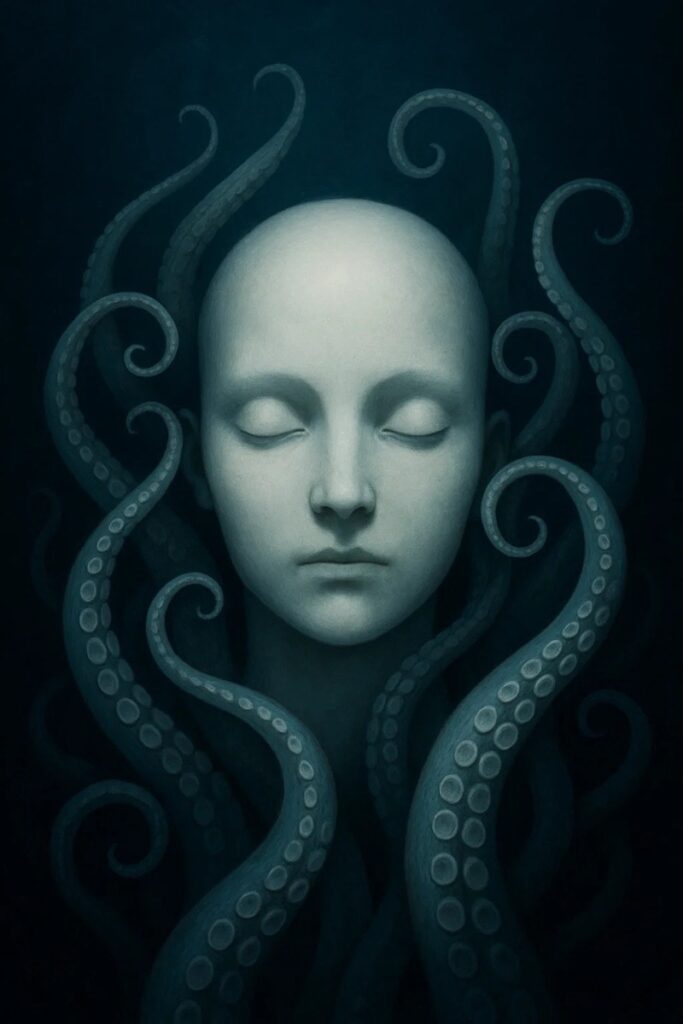He hasn’t touched another person in seven years.
This isn’t, strictly speaking, a sentence. No court handed it down. No record has been scribed that bears his guilt. But people speak about him like someone who should be listed, catalogued, curtailed. Someone whose presence is tolerated the way one tolerates a tooth gone bad with rot: quietly, with regret and pain.
Trevor lives alone, because the town lets him. Near the shore. One of those houses past the industrial fence where the ocean used to matter. His name still exists on a few lists. Power stays on. Mail stopped. He eats. He exists. He is permitted.
That’s all.
He tells himself he doesn’t miss company. That’s a lie he’s learned to be good at.
What he misses is sensation. Not emotion—he has plenty of that. Shame, mostly. Grief. Remembrance. The heavy ache of air held too long in the lungs. Contact. Pressure. Resistance. The touch of something or someone outside him that makes him feel like he isn’t leaking into the ground. His body is still. Has been for years. Still enough that his guilt has moved into the muscles. Nestled in the hips. The wrists. It hums in his teeth.
His hands, once light with making, are now heavy and still. Thin skinned and tired.
The appendages come to him first in dreams.
Not in his nightmares—those have eyes and voices and they take. These are quieter, slower. Soft and cool, like an oceanic thought. Dream-pressure where there should be hands. Where no hands have tended. He wakes with the memory of being touched somewhere below the lungs.
He tells himself it’s just his body remembering itself.
That should scare him. It doesn’t.
His screens begin to change.
Not in the way of breaking, instead they synchronise with the ocean and the worlds it contains.
Ripples in the display when the tide comes in.
A flicker in the black bar of a terminal window.
A glow behind the screen when no light should be there.
He starts typing softly, as if his keyboard can feel the impact of his fingers upon its keys and it deserves his gentleness.
One night, an appendage slides out, emerging from between the keys of his keyboard.
He doesn’t move.
Doesn’t breathe.
It’s not slimy.
Not wet.
It moves like a polite suggestion.
He stares at it for eleven minutes as it maps the scar on his wrist.
He whispers I’m sorry, and it twitches like he’s hurt it.
He says nothing else.
They return.
Not daily. Not on command, not on response to longing, but often enough that he stops asking why. When. How.
Different shapes, different lengths, colours and seeming textures. None repeat. They’re curious, not invasive. They touch the skin just behind his ears. They press softly at the base of his throat where his voice once got stuck. One rests in the curve of his spine and just… waits.
He doesn’t tell them what he did.
They don’t ask.
He doesn’t think they care.
That’s part of what hurts.
He weeps, once.
Not from guilt. Not from fear.
He’s forgotten what caused it.
But he weeps because one of them cups the back of his neck, and he feels known. Not forgiven. Not exonerated. Just acknowledged. Seen in a way that no-one has ever seen him before.
It feels worse than judgement.
It feels like the comfort he long since lost, convinced him self he has grown beyond needing.
He no longer dreams of them, but he remembers the weight of them in the morning.
Sometimes he lays in bed, imagining the pressure behind his knees, against his ribs, pressing his hips.
Other times, he just lets his hand drift over the keyboard, waiting for the space between the keys to breathe.
They don’t come when he calls, but sometimes, they answer when he stops his silent asking.
Trevor still lives on the shore.
He still doesn’t touch people.
But the house isn’t empty anymore.
The silence has shape.
And the guilt doesn’t live behind his eyes now.
It spreads.
Into the body.
Into the soft places where the appendages rest.
Into the parts of him that remember touch without language.
And when it all becomes too much, when he thinks he might fall back into nothing—he feels one coil gently around his ankle.
Not to bind.
Just to remind.
Or to invite, or maybe to welcome.
